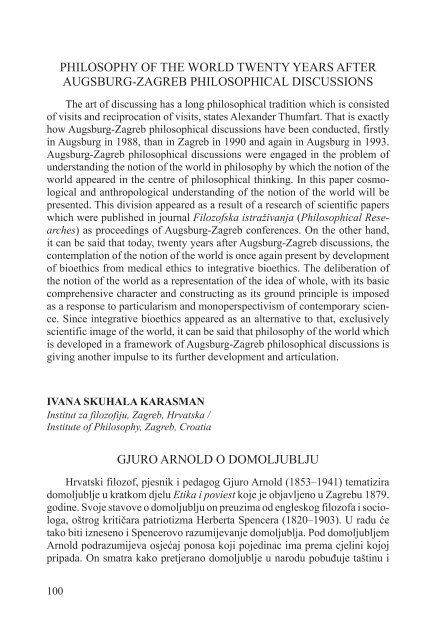Programska knjižica - Hrvatsko filozofsko društvo
Programska knjižica - Hrvatsko filozofsko društvo
Programska knjižica - Hrvatsko filozofsko društvo
You also want an ePaper? Increase the reach of your titles
YUMPU automatically turns print PDFs into web optimized ePapers that Google loves.
PHILOSOPHY OF THE WORLD TWENTY YEARS AFTER<br />
AUGSBURG-ZAGREB PHILOSOPHICAL DISCUSSIONS<br />
The art of discussing has a long philosophical tradition which is consisted<br />
of visits and reciprocation of visits, states Alexander Thumfart. That is exactly<br />
how Augsburg-Zagreb philosophical discussions have been conducted, firstly<br />
in Augsburg in 1988, than in Zagreb in 1990 and again in Augsburg in 1993.<br />
Augsburg-Zagreb philosophical discussions were engaged in the problem of<br />
understanding the notion of the world in philosophy by which the notion of the<br />
world appeared in the centre of philosophical thinking. In this paper cosmological<br />
and anthropological understanding of the notion of the world will be<br />
presented. This division appeared as a result of a research of scientific papers<br />
which were published in journal Filozofska istraživanja (Philosophical Researches)<br />
as proceedings of Augsburg-Zagreb conferences. On the other hand,<br />
it can be said that today, twenty years after Augsburg-Zagreb discussions, the<br />
contemplation of the notion of the world is once again present by development<br />
of bioethics from medical ethics to integrative bioethics. The deliberation of<br />
the notion of the world as a representation of the idea of whole, with its basic<br />
comprehensive character and constructing as its ground principle is imposed<br />
as a response to particularism and monoperspectivism of contemporary science.<br />
Since integrative bioethics appeared as an alternative to that, exclusively<br />
scientific image of the world, it can be said that philosophy of the world which<br />
is developed in a framework of Augsburg-Zagreb philosophical discussions is<br />
giving another impulse to its further development and articulation.<br />
IVANA SKUHALA KARASMAN<br />
Institut za filozofiju, Zagreb, Hrvatska /<br />
Institute of Philosophy, Zagreb, Croatia<br />
GJURO ARNOLD O DOMOLJUBLJU<br />
Hrvatski filozof, pjesnik i pedagog Gjuro Arnold (1853–1941) tematizira<br />
domoljublje u kratkom djelu Etika i poviest koje je objavljeno u Zagrebu 1879.<br />
godine. Svoje stavove o domoljublju on preuzima od engleskog filozofa i sociologa,<br />
oštrog kritičara patriotizma Herberta Spencera (1820–1903). U radu će<br />
tako biti izneseno i Spencerovo razumijevanje domoljublja. Pod domoljubljem<br />
Arnold podrazumijeva osjećaj ponosa koji pojedinac ima prema cjelini kojoj<br />
pripada. On smatra kako pretjerano domoljublje u narodu pobuđuje taštinu i<br />
100

















